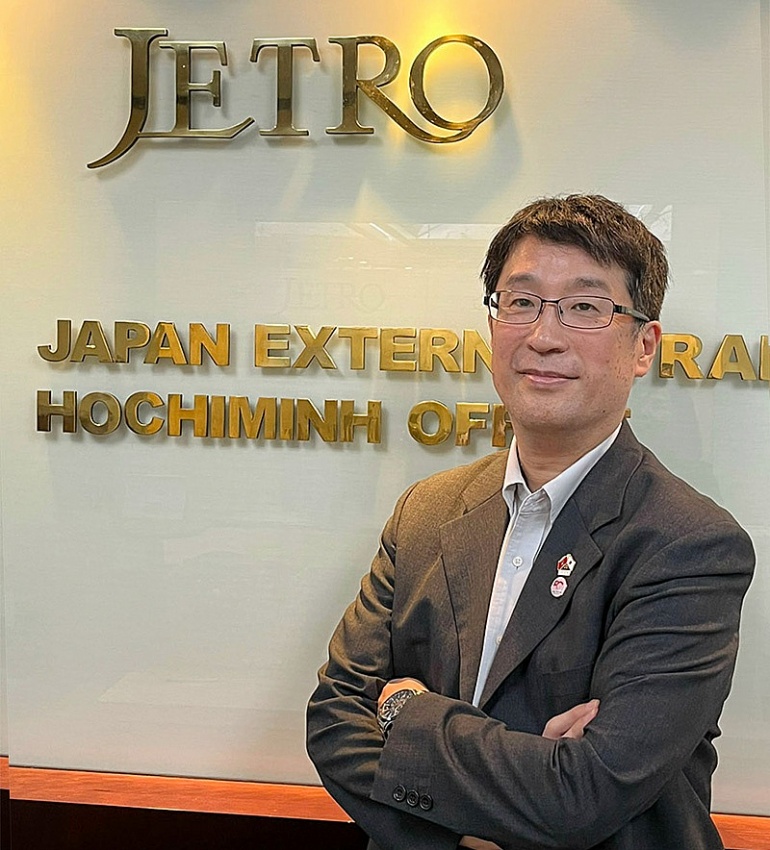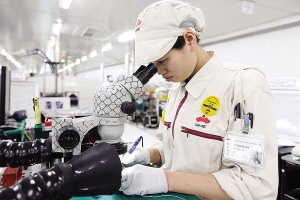Japan-Vietnam economic ties on long-term trajectory
Could you shed some light on the elevation of Vietnam-Japan relations to a comprehensive strategic partnership?
 |
| Matsumoto Nobuyuki, chief representative of the Japan External Trade Organization (JETRO) in Ho Chi Minh City |
This year marks 50 years of the establishment of diplomatic relations between Japan and Vietnam. In November, Nishimura Yasutoshi, Minister of Economy, Trade and Industry, visited Vietnam and held a joint committee on cooperation with Nguyen Hong Dien, Vietnamese Minister of Industry and Trade.
Also last month, Vietnamese State President Vo Van Thuong visited Japan, with both nations upgrading the Japan-Vietnam relationship to a comprehensive strategic partnership. Furthermore, Prime Minister Pham Minh Chinh is scheduled to fly to Japan on December 16 to attend the ASEAN-Japan Special Leaders’ Meeting.
Based on the cooperative relationship between the two governments, exchanges at the private sector level are expected to become more active, and we will do our utmost to be of service in this regard, and we look forward to even closer economic ties between the two countries.
What are the investment and trade ties between Vietnam and Japan so far?
Looking at trade between Japan and Vietnam, it increased from about $2.74 billion in 1998, a quarter of a century ago, to $40.4 billion in 2022. The cumulative amount of investment in that time was approximately $69 billion, ranking third after South Korea and Singapore. In terms of the number of members of the Japanese Chamber of Commerce and Industry in ASEAN, Vietnam has just over 2,000 companies, far more than the 1,630 companies in second-placed Thailand.
This year, due to the decline in overseas demand and the weak yen, trade in January-October showed only a slight increase of 1.6 per cent over the same period of the previous year, and as for investment, a 32.5 per cent decrease.
The depreciation of the yen has had a particularly large impact, weaker by 43 per cent compared to three years ago, greatly reducing the desire to expand overseas. However, looking at the number of investments, it increased by 23.3 per cent. The number of visitors to JETRO Ho Chi Minh City continues to be high, suggesting that interest in Vietnam is still very high.
Japan and Vietnam want to strengthen the resilience of supply chains to ensure stable production activities for both sides. What is the importance of Vietnam in Japan’s supply chain?
The experience of the supply chain disruption caused by the pandemic has made the establishment of resilient supply chains a major issue, and among these, Vietnam has attracted the interest of many Japanese companies due to its geopolitical advantages, excellent human resources, and free trade agreements with many countries.
When expanding into Vietnam, companies check a wide range of factors, including the availability of investment incentives, the state of infrastructure, the possibility of domestic procurement of necessary raw materials, parts, and the living environment. Although Japanese companies are sometimes criticised for being slow in making investment decisions, one of the reasons is that many companies are not interested in short-term business, but rather in business from a long-term perspective.
JETRO is also supporting the overseas relocation of manufacturing facilities through a programme to strengthen the overseas supply chain for companies diversifying their supply chains financially, and also providing various other types of support.
What are the priority industries to see more investment and cooperation opportunities between both sides?
As in the United States, the semiconductor sector is one of the most promising areas for future expansion. Semiconductor manufacturers and manufacturing equipment companies with a high share of the global market have already established operations in Vietnam, and other companies are also interested in the country.
The textile and garment industry also remains promising. Although Vietnam may have a strong image as a country where labour costs are low, an increasing number of companies are positioning Vietnam to play a commanding role in overseeing the entire Asian market. Traditionally, Singapore and Thailand have played this role, but we look forward to seeing how this will change in the future.
 | JETRO believes in enticing prospects for Quang Binh The Japan External Trade Organization highly appreciates the strengths and promising land of Quang Binh province for projects in areas like renewable energy, tourism, and manufacturing. |
 | JETRO survey finds 57 per cent of Japanese companies plan to expand in Vietnam A total of 56.7 per cent of the Japanese companies currently present in Vietnam plan to expand their operations in the country over the next 1-2 years, according to the Japan External Trade Organisation (JETRO). |
What the stars mean:
★ Poor ★ ★ Promising ★★★ Good ★★★★ Very good ★★★★★ Exceptional
Related Contents
Latest News
More News
- The next leap in Cloud AI (December 11, 2025 | 18:19)
- Vietnam’s telecom industry: the next stage of growth (December 11, 2025 | 18:18)
- Five tech predictions for 2026 and beyond: new era of AI (December 11, 2025 | 18:16)
- CONINCO announces new chairman and CEO (December 10, 2025 | 11:00)
- How AWS is powering the next-gen data era (December 09, 2025 | 13:14)
- Outlook in M&A solid for Singapore (December 08, 2025 | 10:31)
- Vietnamese firms are resetting their strategy for global markets (December 05, 2025 | 17:04)
- LPBank Securities accelerates AI and data innovation with AWS (December 05, 2025 | 09:00)
- Improving traceability capacity with Zebra Technologies (November 26, 2025 | 10:08)
- Ho Chi Minh City engages 500 CEOs in dialogue on building global megacity (November 25, 2025 | 16:00)

 Tag:
Tag:



















 Mobile Version
Mobile Version